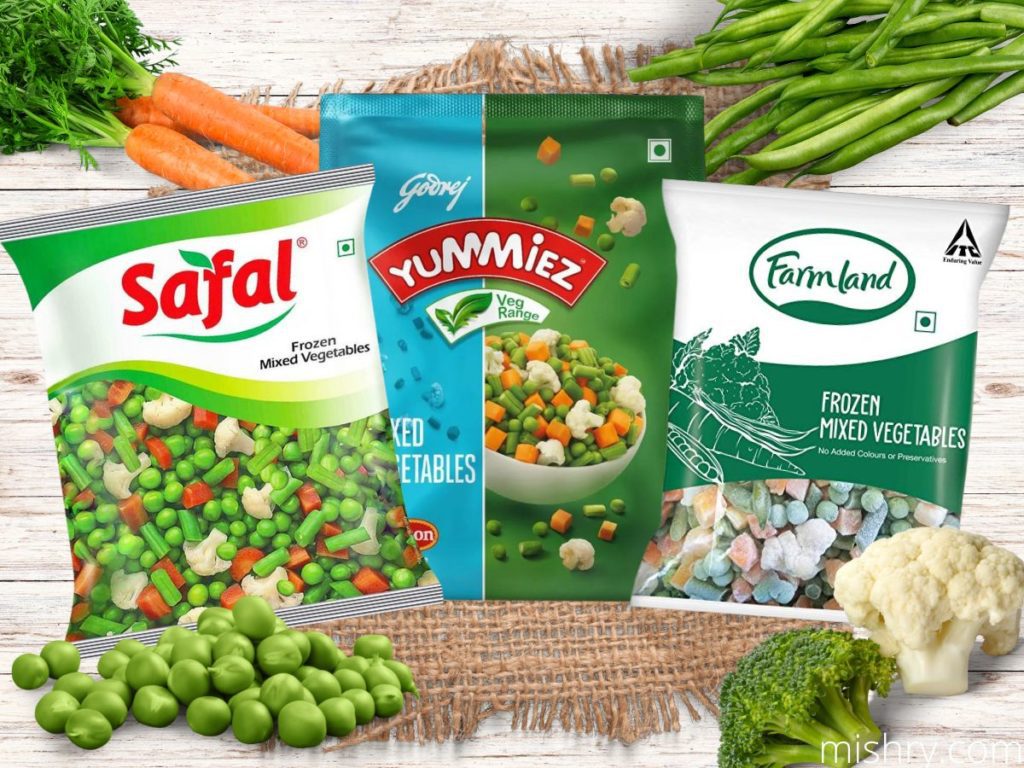Frozen veggies are often looked down on as undernutritious alternatives to the real thing. Don’t get us wrong, nothing could ever beat freshly picked veggies pulled straight from the soils of the earth. But we are here to bust some myths and add more convenience to your time in the kitchen, you’re welcome.
We chose three contenders for our best frozen vegetables brands review – Safal, ITC Farmland, and Godrej Yummiez. In addition to crowning one of these, we share the 411 on frozen veggies.
Ready to learn?
Table of Contents
Quick Comparison of Frozen Vegetable Brands
Here is crucial information on the three contenders.
| Best Frozen Vegetables Brands | Mishry Rating | Buy Now |
| Safal | 4 | On Amazon |
| ITC Farmland | 3.5 | On Amazon |
| Godrej Yummiez | 3 | – |
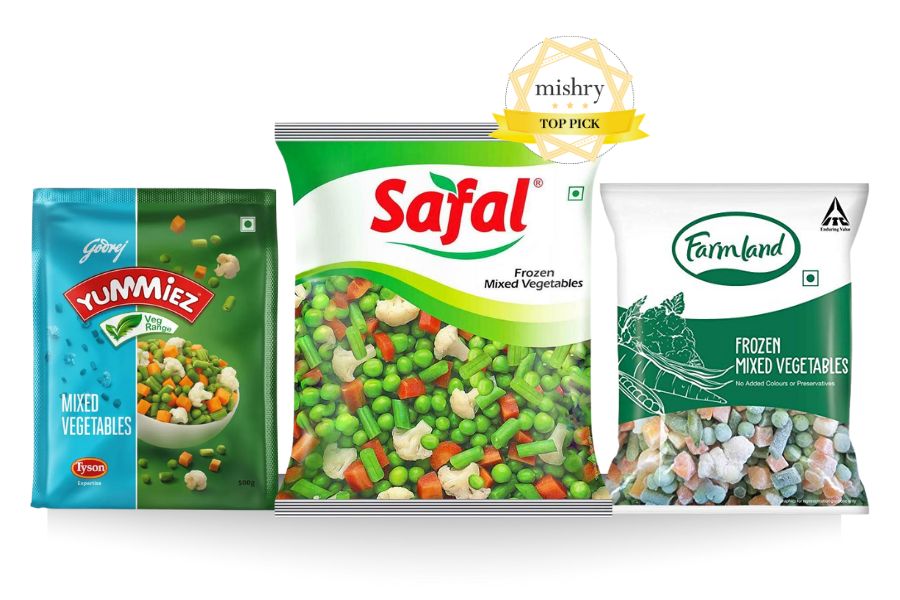
Our Review Factors
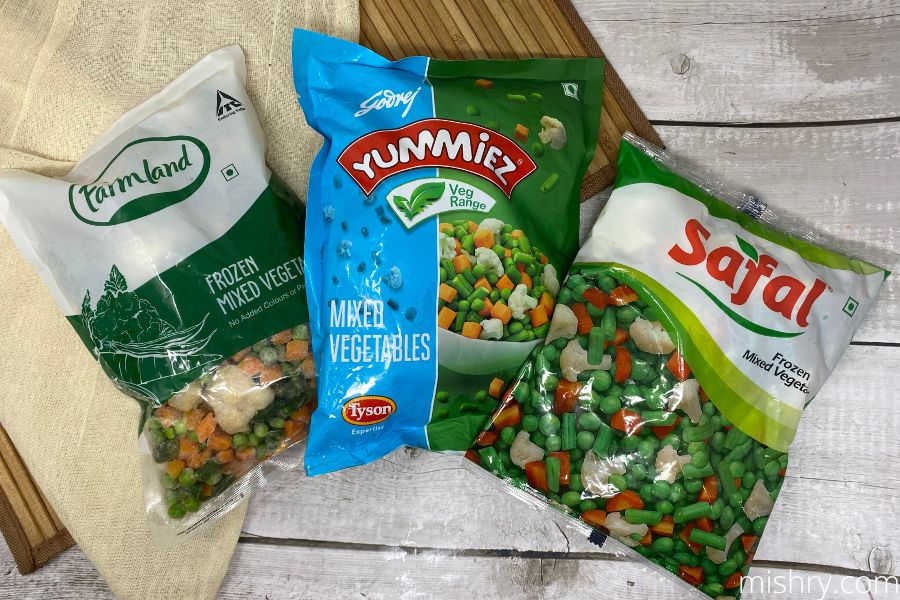
Taste and texture remain the prime parameters for our best frozen vegetables brands review. In addition to these, we also took into account factors like the ingredients, appearance, and overall quality.
1. Taste
Do the vegetables retain their natural flavors? For instance, corn and peas have a certain sweetness, French beans taste muted with some starchiness, while carrots have an earthy sweetness.
So how close did these packaged, frozen variants come to the real deal?
2. Texture
While some veggies are chewy and juicy, other have a firmer bite by nature. Under this parameter, we gauged the pre and post-cooking texture of the frozen vegetables. Were they limp and mushy, or did they have a soft, firm bite?
3. Freshness
We clubbed freshness and quality under one.
While taste and texture are the key indicators of freshness, here we gauged the appearance. Are the veggies peeled properly? Are the cuts even? Do they look vibrant, or did we notice some dark spots?
4. Other Parameters
The price, packaging, shelf life, proportion of veggies, and other non taste-based parameters were considered here.
Our Review Process
We thawed a portion outside the refrigerator. These were blanched for around 10 minutes in order to eliminate any excess ice build up.
We prepared a basic sabzi with some some oil, ginger, salt and chillies. No onion/tomato was used as it would significantly influence the taste of the veggies.
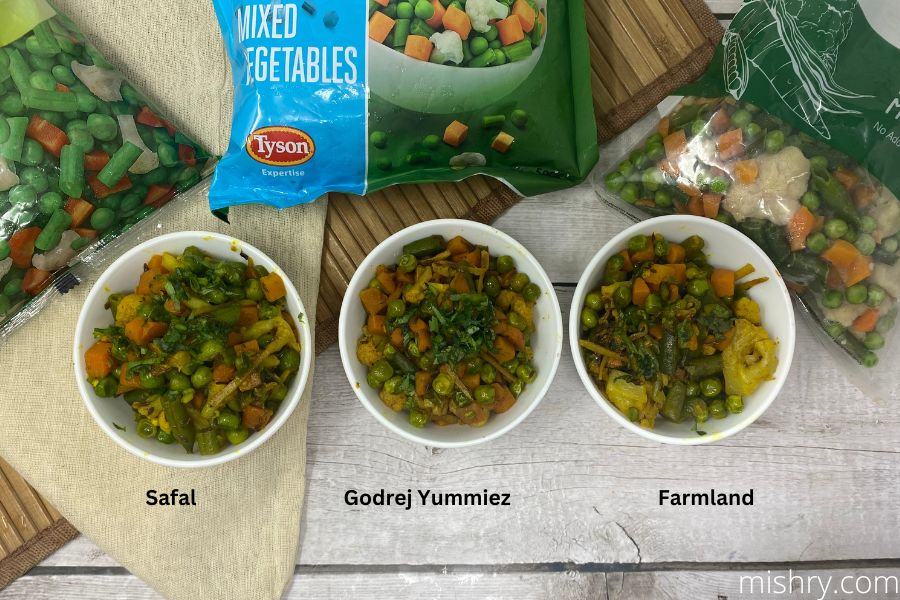
The 411 on Frozen Veggies – Busting Myths
Before we dive into details of our testing and the verdict, here are some facts, myth-busters on frozen veggies.
How are frozen vegetables frozen? What is the process?
Essentially, vegetables are frozen immediately after harvest. This quickness ensures maximum nutrient retention.
This nutrient retention varies from vegetable to vegetable. For instance, frozen broccoli has more riboflavin as compared to frozen peas.
The steps are- cook veggies in boiling water (blanch) for a minute or two. Follow this up by briefly dipping them in ice water until chilled.
Drain the water, pat the veggies dry and place them in a freezer-safe container.
If you do not have this, you can just as easily freeze the veggies on some baking sheet.
Next, freeze them with a vacuum sealer. This is to prevent any contact with air, which may affect the flavor.
What are the potential benefits of frozen vegetables?
Firstly- convenience. Frozen vegetables help to enhance your intake of micronutrients and fiber with convenience. Next, you have access to almost every vegetable all-year round.
Frozen vegetables also help you get a bang for your buck as they are relatively cheaper, have a longer shelf life (this means chances of veggies going bad before you use them are lower).
Common Mistakes with Frozen Veggies You Can Avoid
1. Defrosting before cooking
Thawing results in limpy vegetables after cooking. Most frozen vegetables must be added directly to the recipe you are preparing. They will have a better, more natural texture.
However, there are exceptions. You must defrost leafy vegetables (spinach, for instance) as these leaves are packed in a solidified block.
2. Adding Heat
We do not really boil, steam, or microwave fresh vegetables. So why would you do that with the frozen counterpart?
Instead, dry heat cooking alternatives like sauté/roast work way better and deliver significantly better results.
3. The shelf life is a real limit
As mentioned above, frozen veggies certainly have a longer shelf life than fresh ones. But does that mean you can store them for months and months? NO, you should not. It may not impact the vegetables nutritionally, but storing frozen vegetables past their shelf life dry them out, and deteriorate the taste and texture.
Therefore, in our opinion, there are definitely certain variations between fresh and frozen vegetables. But these differences also occur based on modes of cooking, seasonings, pairing them with other macronutrients, etc.
Though fresh cannot be compared to frozen, frozen vegetables can make for a nutritious and convenient addition to your diet.
Frozen Mixed Vegetables – Detailed Review
This section discusses all the details about the brands we tested.
1. Safal Frozen Mixed Vegetables – Mishry Top Pick
Our Experience
There was no shred of doubt when it came to honoring Safal’s frozen vegetables as our Top Pick. It fared exceptionally across parameters.
This was a balanced mix of green peas, cauliflower florets, carrot cubes, and French beans. The veggies looked fresh, vibrant, and quite appetizing. We liked how there were no random dark patches or spots at all, thumbs up. These were chopped fairly uniformly which would ensure a similar cooking time.
On to tasting…
The veggies cooked really well yet retained a soft bite. The sweet peas and carrots, juicy beans and fresh cauliflower – all of them retained their original flavors and did not feel stale, limp or watery. The freshness of the frozen vegetables by Safal is commendable.
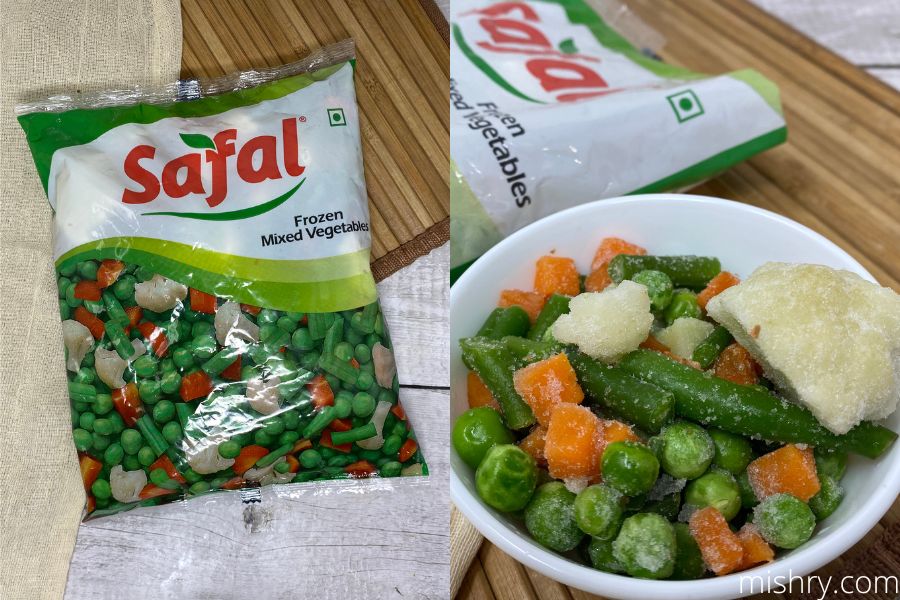
Product Features
A 500-gram pack is priced at Rs 80/- and has an 18-month shelf life. This comes in a green pouch and cannot be resealed.
The ingredients are green peas, cauliflower florets, carrot cubes, and french beans.
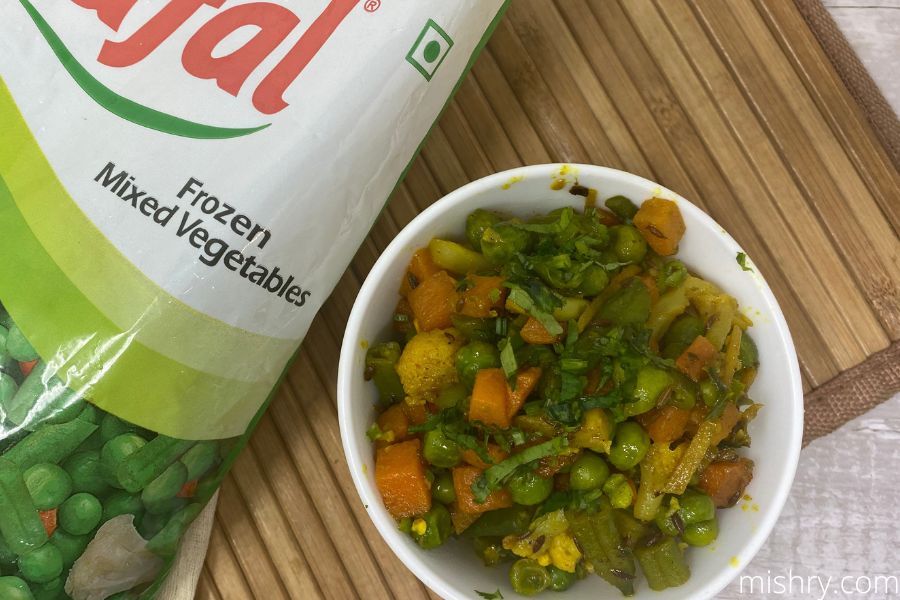
- Looks appetizing
- Almost identical cuts
- Very vibrant
- No additives
- Soft bite
- Fresh tasting
For your sabzis or pulaos, even snacks like tikki/cutlets, Safal Frozen veggies are a quick way to get the fiber and micronutrients.
2. Farmland Frozen Mixed Vegetables
Our Experience
ITC Farmland Frozen veggies were a small step down from our Top Pick. Despite having a vibrant appearance, these did not look desirable. The cuts were wildly uneven. There were some whole beans, some humongous florets of cauliflower, and also some super thin slivers of carrots. This doesn’t just impact the visual appeal but it also disturbs the time it requires to be cooked evenly.
That said, these did taste fresh which was a saving grace.
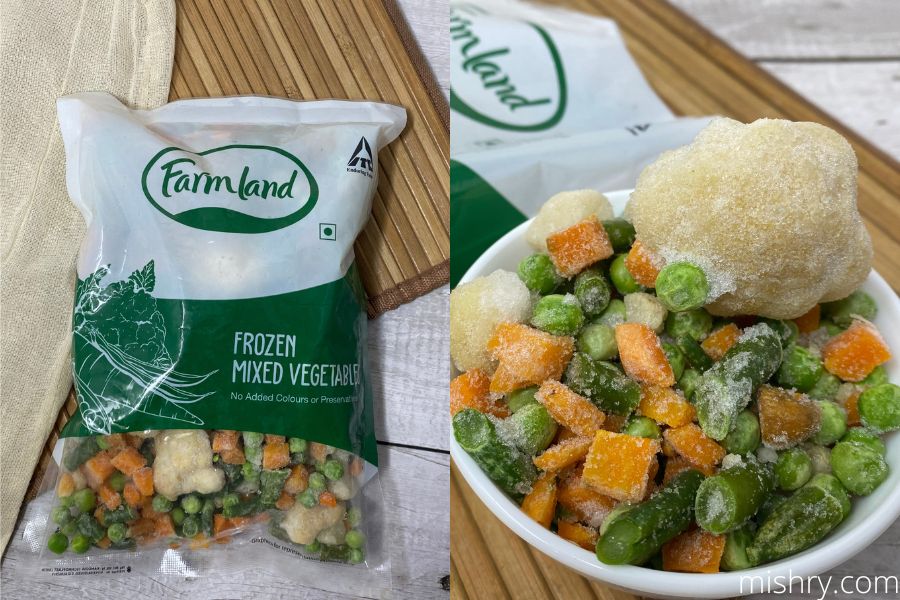
Product Features
This half kg pack is priced at Rs 70/- and has a shelf life of 12 months. The ingredients are frozen green peas (35%), frozen cauliflower (25%), frozen carrot (25%), and frozen french beans (15%)
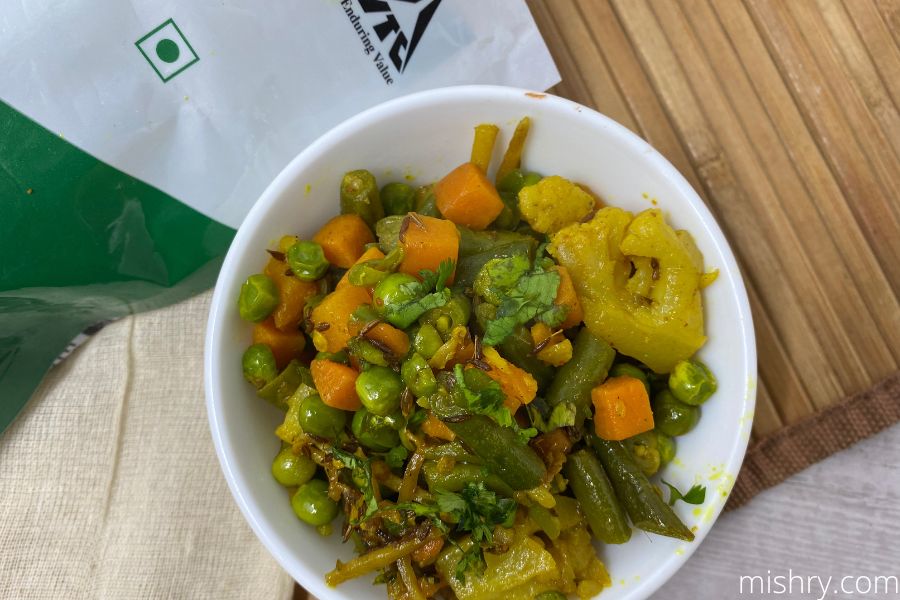
3. Godrej Yummiez Mixed Vegetables
Our Experience
The overall quality of Godrej Yummiez frozen vegetables was below average. Neither appearance nor the taste were decent. These veggies lacked freshness in terms of color. They have been chopped/sliced very finely which brings down the versatility. Even the characteristic flavors of veggies (sweetness of carrots, and peas; the taste of beans) were poor.
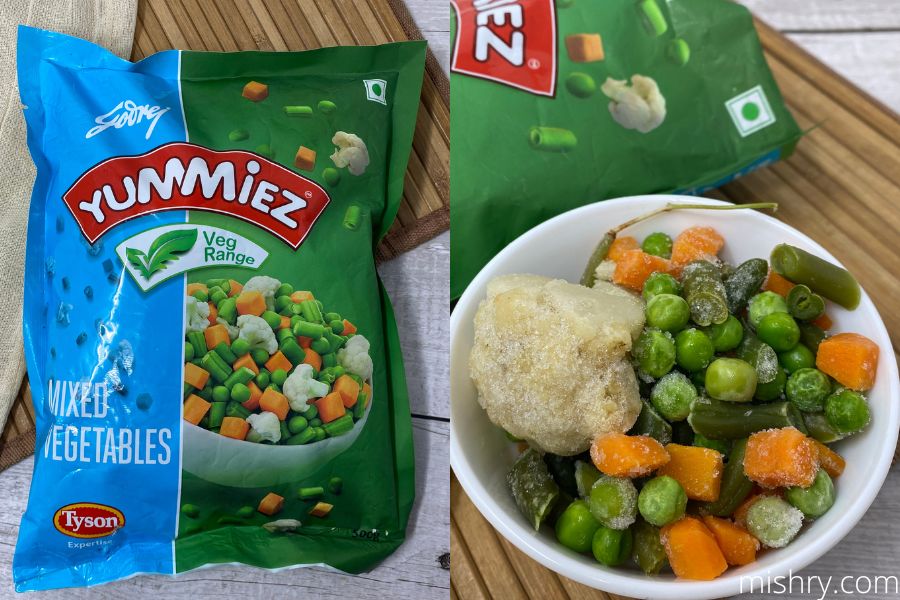
Product Features
Godrej Yummiez Frozen Vegetables are offered in packs of 500 grams, priced at Rs 90/- The shelf life a year and half (18 months)
The main ingredients are carrots, cauliflower, french beans, and green beans.
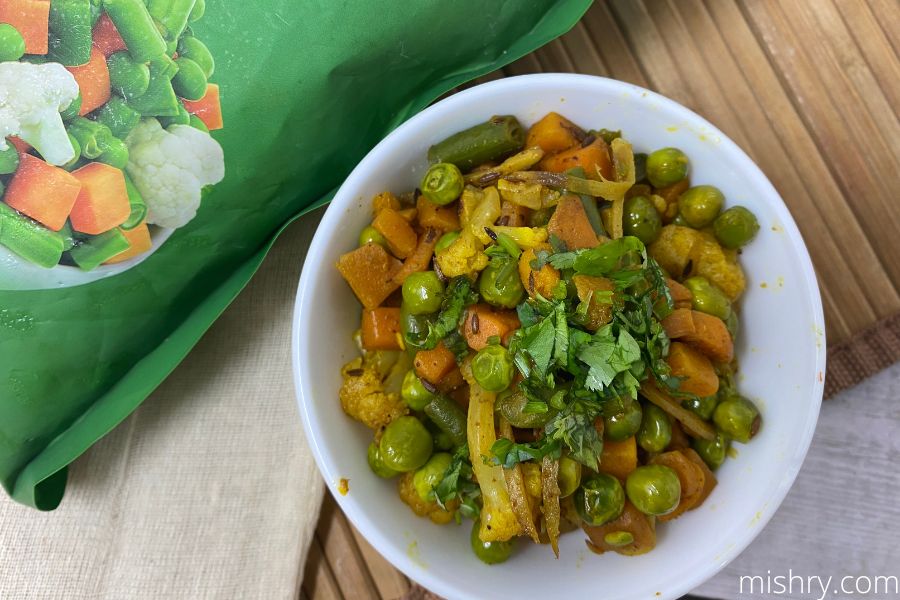
- Lack vibrancy
- Veggies lack freshness
Our Top Picks & Recommendations
Why did we choose Safal as our Top Pick?
Safal Frozen Mixed Vegetables were rightly our Top Pick as they had the correct texture, the natural flavors and appearance, plus were chopped evenly. The vegetables tasted fresh and were appealing to look at. These retained a desirable texture post-cooking also.
Frequently Asked Questions
Here are some interesting FAQs on best frozen vegetables brands.
1. Are frozen vegetables good for your health?
Yes, but we always recommend perusing the ingredient list.
2. Do frozen vegetables have the same nutritional value as the fresh ones?
This differs across vegetables. But more often than not, the nutritional value is retained well.
3. Do frozen vegetables contain harmful preservatives?
No, none of the brand we reviewed contains preservatives.
4. Do frozen vegetables have the same taste as the fresh ones?
While our experience with Safal Frozen veggies was commendable, it may not always be the same.
5. Are frozen vegetables high on carbs?
No, like fresh vegetables, frozen vegetables have a moderate carbohydrate content.
In Conclusion…
Be it taste or texture, and appearance too, Safal Frozen Mixed Vegetables fared well across these crucial parameters. They contain no additives, but primarily the close-to-fresh taste and texture made this the winner.
What’s your take on frozen veggies? Would you add them to cart?
Our reviews are unbiased and all samples used during the reviews were paid for by us. Read our entire ethics statement here.

